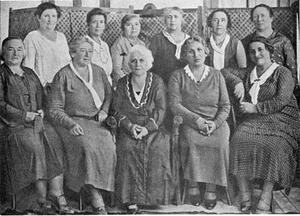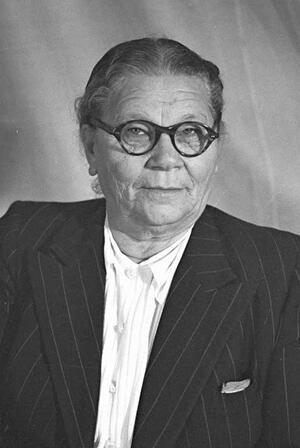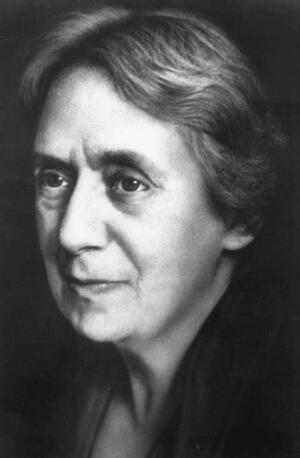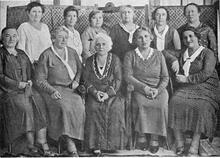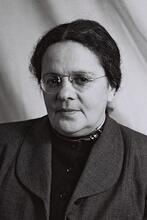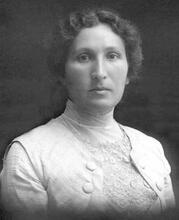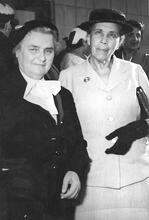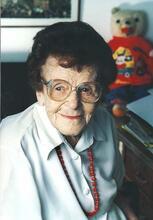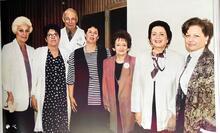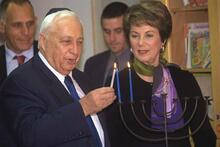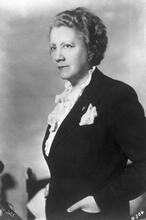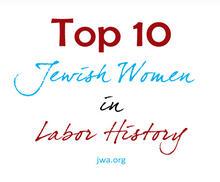Suffrage in Palestine
Courtesy of Ha-Keren le-Ezrat ha-Isha.
The first debates over women’s suffrage in the Yishuv occurred in 1917. Women’s suffrage activists mobilized their communities, and successes at the local level laid the foundation for the national level. Three gatherings took place in 1918 to discuss regulations for upcoming national elections, and debates over women’s suffrage were central. Uniquely, Jewish women in pre-state Israel fought to preserve their right to vote, granted by the preparatory committee for the National Assembly, rather than for inclusion in existing political structures, as in other countries. In 1920, fourteen women were elected to the National Assembly, and the ultra-Orthodox walked out. In 1923, the Mizrahi party demanded a referendum on women’s suffrage. The Union of Hebrew Women successfully mobilized to cancel the referendum. The ultra-Orthodox boycotted elections for the Constituent Assembly in 1925, and 25 women were elected. The Assembly decreed full equal rights for women in all areas of civil, economic, and political life.
Prior to the second Zionist Congress in August 1898, the preparatory committee headed by Theodor Herzl decided that women would have the right to vote in institutions created in the Yishuv. Women’s suffrage became a symbol of Herzl's wish to establish a very modern Jewish state. Yet, this decision went largely unnoticed; it remained only a declaration and was not implemented in elections to the Jewish committees organized in the new settlements in Ottoman Palestine. Indeed Herzl’s own ambivalence is reflected in the fact that the hero of his 1902 utopian novel Altneuland declares that his wife is not interested in the national elections of the Jewish state and prefers to stay home with their baby. A rare debate concerning the issue took place in Zichron Yaakov in the summer of 1903, in the context of an attempt to form an organization of all the Jews residing in the country. The attempt to form the overall organization failed; in any case, the meeting to prepare it declared that women would not be able to be members or to vote.
Women’s Suffrage at the Local Level
In the fall of 1917, after the British conquest of the region, the question of women’s suffrage arose in the Jewish community at both the local and the national levels. The first debate arose in Rishon LeZion in November 1917. The main speaker was Nehamah Pukhachewsky, a Hebrew author, who said: “We can live no longer without fully equal rights. We who build the settlement together with the men… Give us what is ours – as in England and Germany, we demand full rights.” In 1918, Pukhachewsky organized the first local political women's organization, whose aim was to secure the right to participate in local elections. The women of Rishon LeZion succeeded, and they took part in local elections for the first time in December 1919. Two women— Pukhachewsky herself and Adina Kahansky—were elected to the Rishon le-Zion community council. Since Pukhachewsky won first place among all those elected, she could have been appointed head of the committee; while she declined the position, she remained active in community life.
The very existence of local women's organizations in some settlements was due to the existence of women’s mutual-aid societies, which were organized prior to World War I. Each activist’s unique personality and her community activity led to the ability of women not only to vote but to be elected.
A similar debate took place in the Jaffa and Tel Aviv community councils in 1919. The first woman to be elected there was Rachel Gur. Other very active personalities included Ada Fishman Maimon, Fania Metman-Cohen, and Esther Yevin. In 1919, after a protracted struggle and persuasive meetings conducted by the Haifa Women’s Organization, Rahel Luntz was elected to the Haifa local council. These local successes laid a foundation for the struggle on the national level. In some communities the local struggles dragged on for a very long time. In Jerusalem women received the right to vote in 1932 and in Petach Tiqua only in 1940.
Women Suffrage and the First National Elections
The debates concerning women’s participation in local elections were proof that women’s place was not yet assured in the public institutions of the Zionist society. The most important debate took place concerning elections for the newly established National Assembly. The debate began in a promising way. One woman, the agronomist Rahel Yanait Ben-Zvi participated in the first small assembly that took place in November 1917 to plan the new institution. Yet despite the fact that a woman was a member of the preparatory committee, the issue of the right of women to take part in the elections provoked a long and stormy debate. The temporary committee decided that the elections would be “honest, equal, secret, inclusive, with no regard to status” but also that “concerning sex, the temporary committee shall debate on whether the times and conditions are suitable to implement this matter in reality.”
Three national gatherings with dozens of representatives of the Jewish community took place in 1918 to discuss regulations for the upcoming national elections. The main controversy was the issue of women’s vote. The Orthodox circles opposed the suggestion wholeheartedly. The fact that women’s suffrage had not been decided upon came to the attention of women in various places and they hastened to respond. On February 13, 1918, twenty-three women from Rishon le-Zion sent a sharp and angry letter to the representatives of the organizational committee, saying:
Taking note of this significant moment, a time when all the matters of our people in the country are being put in order, when every member of the public needs to participate without regard to sex or status: We, the undersigned, demand our right to participate in the elections to the National Assembly. [(No Author) Memories on the Jaffa Committee, 1918, pp. 17 – 18]
The matter of women’s suffrage became a point of controversy between the ultra-Orthodox parties and the Mizrahi movement on the one hand, and the workers’ parties and the general public on the other, causing repeated postponement of the elections. The ultra-Orthodox parties staunchly opposed women’s participation in the elections, and the Mizrahi party joined them in the hope of achieving a compromise. The Mizrahi movement sought to postpone the decision for one or two years in order to persuade its own members and the ultra-Orthodox residents of Jerusalem to accept women’s right to vote. In response, the working committee of the women’s union sent an angry letter of protest to the temporary committee in Jaffa, maintaining that since Herzl’s time the Zionist community in Palestine and the Lit. (Greek) "dispersion." The Jewish community, and its areas of residence, outside Erez Israel.Diaspora had opted for women’s equality. The letter accused the Mizrahi movement of trying to revoke women’s suffrage only in Palestine. The authors pointed out their loyalty to the Zionist community and expressed the hope that they would always have an assured place “without noise or fuss,”
Due to the demand to include women, the ultra-Orthodox community and the Mizrahi movement continued to oppose the elections for the Constituent Assembly, which were postponed six times and finally scheduled for April 1920. The main reason for the postponement was hesitation on the part of the Mizrahi movement, which on the one hand sought cooperation with secularists for reasons of national necessity and an affinity for the values of the modern world, but on the other hand was unable to sever itself completely from the ultra-Orthodoxy of the old [jwa_encyclopedia_glossary]Yishuv[/jwa_encyclopedia_glossary].
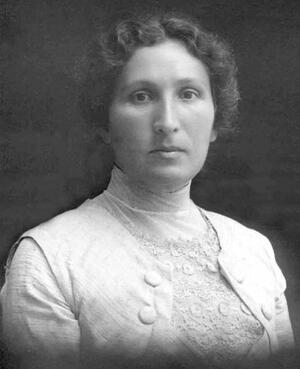
From an early age, educator and women's activist Sara Azaryahu (1873-1962) (shown here in 1915) was concerned with two major problems: the inferior status of the Jewish people and the inferior status of women. Following her aliyah she devoted the rest of her life to both the causes she held dear: Zionism and equal rights for women.
Institution: Arnan (Sini) Azaryahu
A unique situation existed at that time in the country. Since there was no elected Jewish institution that could form rules for the coming elections, the preparatory committee decided that women could participate in the first elections for the National Assembly, whose first action would then be to decide whether women would be granted the vote. Women were thus granted the de facto right to vote even before any decision in principle had been made in favor of their suffrage. Sara Azaryahu, who was aware of the importance of this unusual measure, called it “a one-of-a-kind maneuver so far unprecedented in women’s organizations in other countries.”
Women participated in the elections and even ran an independent list, the Union of Hebrew Women for Equal Rights. Thus the struggle for women’s suffrage in pre-state Israel differs from that around in the world since, in the latter, women fought for the right for inclusion in the public institutions, while the Hebrew women fought in order to preserve their temporary right to vote.
According to a compromise between the ultra-Orthodox and the temporary committee, special ballot boxes were set up for those men who were willing to take part in the elections due to a special deal. Their women would not vote, but it was agreed that each ultra-Orthodox vote would be counted twice. Twenty parties competed in the elections held on April 19, 1920, only four of which included women on their lists: the Union of Hebrew Women for Equal Rights in The Land of IsraelErez Israel, which was referred to as the Women’s Organization list, the Progressive Party, and the Labor parties (the Workers’ Union and Ha-Po’el ha-Za’ir).
Twenty-two thousand voters—seventy-seven percent of those eligible—participated in the elections. Fourteen women were elected, constituting 4.5 percent of the three hundred and fourteen delegates. The Union of Hebrew Women gained five delegates. Together with two women who were elected as representatives of the Progressive Party who were also members of the Union, they constituted half the women who were elected. The other seven women elected were from the workers’ parties. These results were a defeat for the ultra-Orthodox, who did not have a large power base and were not the largest faction, as they had anticipated. The ultra-Orthodox refused to accept the election results and walked out of the first meeting of the National Assembly in October 1920. However, they continued to serve on the Va’ad Le’ummi (National Council), which was a small committee, without women.
The National Struggle Continues
The debate did not end. In September 1923, the members of Mizrahi demanded a referendum on women’s suffrage in which only men would vote. The women rebelled against this initiative, and in March 1924 the Union of Hebrew Women organized a day of propaganda for women’s rights in Palestine. The day’s events took place in cities and on agricultural settlements, attracting women from all segments of the Yishuv, from the right and left, together with many men who opposed the referendum and supported women’s suffrage. Henrietta Szold expressed the event’s spirit at a public rally held in Jerusalem where she called upon the Yishuv to “preserve at all cost the principles of equality and justice on which our national enterprise is based. Women are devoted partners in the labor and suffering for our homeland’s existence; therefore they must participate equally in determining its character” (Azaryahu, 1957, pp. 26-28). In addition, the Hadassah organization demanded of the National Council that “The elections law that the Constituent Assembly passes [must] recognize Hebrew women’s full right to ‘elect and be elected’ as befits the society reborn in our people’s national homeland.”
Since the threat of the referendum still loomed, the Union of Hebrew Women mobilized Jewish women’s associations, primarily Zionist ones, in Europe and the United States. Members of the Union took advantage of the Zionist Yishuv’s concern for its reputation and its need for international support. They also contacted organizations throughout the world and asked them to send telegrams and letters to the National Council urging the defeat of the referendum proposal. The Union’s many connections, especially those of its leader, Dr. Rosa Welt-Straus, aroused support from Jewish and general women’s organizations worldwide. The Hadassah organization and women’s organizations in Germany, Austria, and Poland sent letters of support. The Hebrew press, which published the telegrams received, also emphasized their importance. Armed with this support, the women flooded the national committee with protests against any attempt to revoke women’s equal rights as citizens. The members of the Union presented the statements from their overseas supporters to the National Council and, in a pamphlet, urged them: “Countries all over the world give women the right to vote, and shall our people in our national homeland take rights away from women when they have exercised them for five years? Will Palestine go forward or backward?” Despite their disclaimer that their national feminist motives were not the same as those of the worldwide women’s movement, they did not hesitate to avail themselves of the achievements of women throughout the world.
At the third meeting of the Constituent Assembly, in June 1925, after a tough period of pressure from Mizrahi and the ultra-Orthodox, the delegates learned of a secret agreement that had been signed between the ultra-Orthodox and the leadership of the National Council, which determined that the granting of suffrage to women was a religious issue and therefore was not within political jurisdiction. However, the ultra-Orthodox agreed to put the matter to a vote by secret ballot, with women’s participation in the assembly conditional upon the results. The agreement sparked vehement opposition among the delegates, but the Mizrahi representatives defended it vigorously, claiming that giving women the right to vote was tantamount to strengthening the left wing, since in any case ultra-Orthodox women would not participate. Sara Azaryahu, a representative of the Union of Hebrew Women, read out telegrams and letters sent by women’s organizations all over the world, disproving the claim that women’s suffrage was a religious issue. To this end, she displayed two ultra-Orthodox propaganda announcements which contradicted one another: the first from the 1920 elections, which in the name of Torah instructed women to vote, and the second from the 1925 elections which, also in the name of Torah, forbade women to vote.
In September 1925, in order to prevent a rift in the Yishuv, the National Council accepted a proposal by Mizrahi to hold a general referendum. The proposal was accepted on two conditions: women would also participate, and the religious sector would promise in advance to abide by the results. The referendum was set for November 8, 1925. The Union of Hebrew Women was divided as to whether to agree to the referendum. The central elections committee felt it was important to win the support of the Union of Hebrew Women and wrote a letter asking that the Union not oppose the referendum. Hope was strong that the referendum would bring about a solution to the problem that had delayed the holding of the Constituent Assembly, but opposition to the very idea of a referendum, especially among the members of the Union of Hebrew Women, was no less forceful.
Esther Yevin, a member of the committee in Tel Aviv, wrote to Sara Azaryahu in Jerusalem to express the opposition of the women of Tel Aviv to the referendum and their anger that such a referendum was even taking place. She criticized the National Council severely:
The referendum is shameful in itself and pains us even more because the National Council has allowed itself to go beyond its mandate and decide on something over which it has no competence. It is also insulting since by a majority of two votes (seven against five), it has assumed the right to determine the fate of half the Yishuv and to decide that, even without that half, the organization will remain whole. (AZM, J/75/4, Nov. 1, 1925,)
The women decided to demand the cancellation of the referendum. They went to the press and invited other women’s unions to join them. Due to disagreements between all the parties involved, the referendum was cancelled. For the first time, the Mizrahi movement turned its back on the old Yishuv and attacked the ultra-Orthodox for opposing the building of the country.
The elections for the second Constituent Assembly took place in December 1925, boycotted by the ultra-Orthodox. As a result, only 56.7 percent of the voting public participated. Of two hundred and twenty-one delegates, twenty-five women (twelve percent) were elected. The Union of Hebrew Women was especially successful, since thirteen of the twenty-five elected women were members. The increase in the number of women in the second Constituent Assembly enabled them to increase their representation on the National Council. Of thirty-eight members of that committee, four were women—Esther Yevin and Sara Azaryahu of the Union of Hebrew Women, Rahel Yanait Ben-Zvi of the Labor Union and Ada Maimon of Ha-Po’el ha-Za’ir. At the end of its first meeting, the second Constituent Assembly in January 1926 decreed equal rights for women in all areas of civil, economic and political life in the Jewish Yishuv in Erez Israel.
Azaryahu, Sarah. The Union of Hebrew Women for Equal Rights in Eretz Israel (Hebrew). Haifa: 1977 (reprint), English translation by Marcia Freedman, Haifa: 1980 (published first in 1949.
Azaryahu, Sara. Chapters of a Life (Hebrew). Tel Aviv: 1957.
Azaryahu, Sara. Report, 1929. Central Zionist Archive, J 875.
Decisions of the Union Council. Central Zionist Archive, J35/14.
Ha-Isha 3 (1926), 32.
Jus Suffragii 15 (1920), 36.
Tahon, Rafi. The Struggle for Equality between the Sexes: The Story of Sarah Thon (Hebrew). Israel: 1996.
Committee meeting, Union of Hebrew Women, February 10, 1925. Central Zionist Archive,
J75/25.
Shilo, Margalit. Girls of Liberty: The Struggle for Suffrage in Mandatory Palestine. Waltham, MA: Brandeis University Press, 2016.

